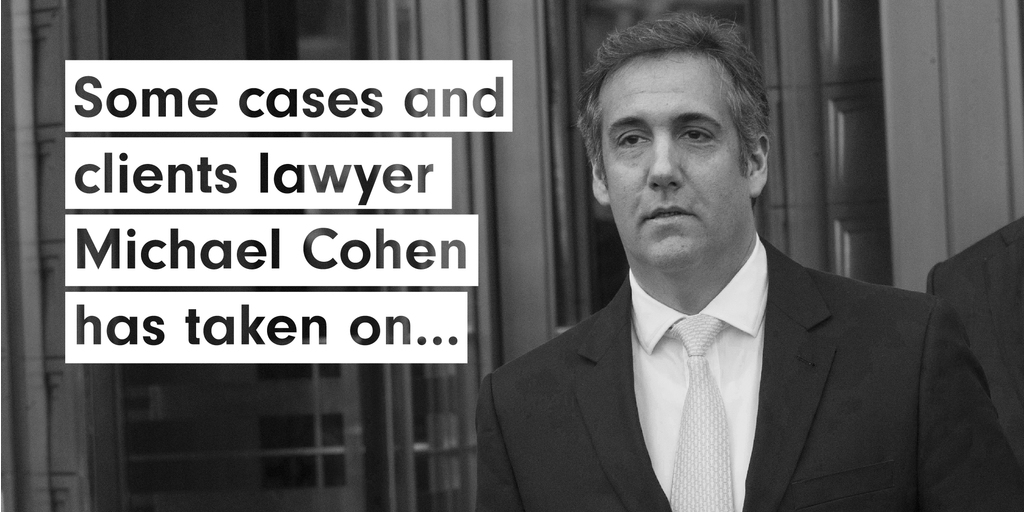Whether you call Michael Cohen a lawyer, thug, or Trump’s “fixer,” he is no saint. He has a proclivity for legal mischief that repeatedly lands him in hot water, whether it is with the FBI or the National Enquirer. Cohen’s schemes range in their scope and scale, but the same amoral, reckless operator lies at the center.
Watch: Is Michael Cohen Trump’s lawyer or his henchman?
1. Staging car crashes
In Cohen’s earlier days, insurance fraud was king. According to investigative reporting by Rolling Stone, Cohen’s clients would cheat insurance companies by staging car crashes and filing phony medical claims to collect payouts. In many of these cases, New York’s no-fault insurance law allowed each victim of a car crash to collect up to $50,000 each from insurance companies — a magnet for fraudsters. Cohen’s clients were subsequently sued by companies like U-Haul and State Farm, even while some of their insurance lawsuits were in court.
As it turns out, insurance scams like the ones Cohen assisted were often perpetrated by Russian organized crime. Cohen, however, was not dragged kicking and screaming into these scams. His first job out of law school was for Melvyn J. Estrin, who was known for exploiting insurance law and eventually pleaded guilty to second-degree bribery.
Read more: Michael Cohen’s money-laundering, Russian mobster associates
2. Hush money
Michael Cohen famously paid pornographic actress Stephanie Clifford, a.k.a. Stormy Daniels, a sum of $130,000 one month prior to the 2016 election for her silence about a 2006 affair she had with President Trump. Cohen reportedly missed two deadlines to pay Daniels, and later complained that Trump did not reimburse him for the $130,000 payment. Daniels was pressured into the settlement, especially after being confronted and told to “leave Trump alone” in a Las Vegas parking lot. Cohen faces allegations of bank fraud, as well as breaking campaign finance laws, for his role in the payments to Daniels.
Keith Davidson, the attorney representing Stormy Daniels in the agreement, worked with Cohen again in 2017 to settle a similar situation for GOP fundraiser Elliott Broidy. Cohen negotiated a settlement in which Broidy paid out $1.6 million to a Playboy model with whom he had an affair. This time, Cohen avoided violating campaign finance laws and allegations of wire fraud, and was not stiffed by his client. Practice makes perfect?
Watch: Michael Cohen’s history of vicious threats
3. Undermining American democracy
Cohen is also a longtime friend of Felix Sater, whom Cohen has known since high school. Sater worked as a developer and investor with the Bayrock Group in Trump Tower SoHo and other projects before he worked as a senior advisor to Trump in 2010. While Felix Sater worked as an FBI informant for much of his career, his work with Cohen was nothing of the sort.
Sater sent emails to Cohen in 2015 talking about how he would getVladimir Putin and Trump to speak positively about one another, and suggesting that Trump Tower Moscow would bolster the then-presidential candidate’s foreign policy credibility. According to emails obtained by the New York Times, Sater wrote to Cohen:
I arranged for Ivanka to sit in Putins private chair at his desk and office in the Kremlin. I will get Putin on this program and we will get Donald elected. … I know how to play it and we will get this done. Buddy our boy can become President of the USA and we can engineer it. I will get all of Putins team to buy in on this.
Then, in January of 2016, Michael Cohen himself emailed Putin’s personal spokesman, Dmitry Peskov, to request help moving the Trump Tower Moscow project along. Peskov did not reply.
Between sketchy clients and seedy lawsuits, Michael Cohen grew from a fraud-happy lawyer to a man out of his league attempting to work with Russians that later tried to undercut faith in American democracy.
Legal Team
From Rudy Giuliani to Michael Cohen, Donald Trump’s legal team has been marked by turnover, infighting, contradictions, and FBI raids. As the President’s legal troubles worsen, so too does the chaos among his lawyers.
